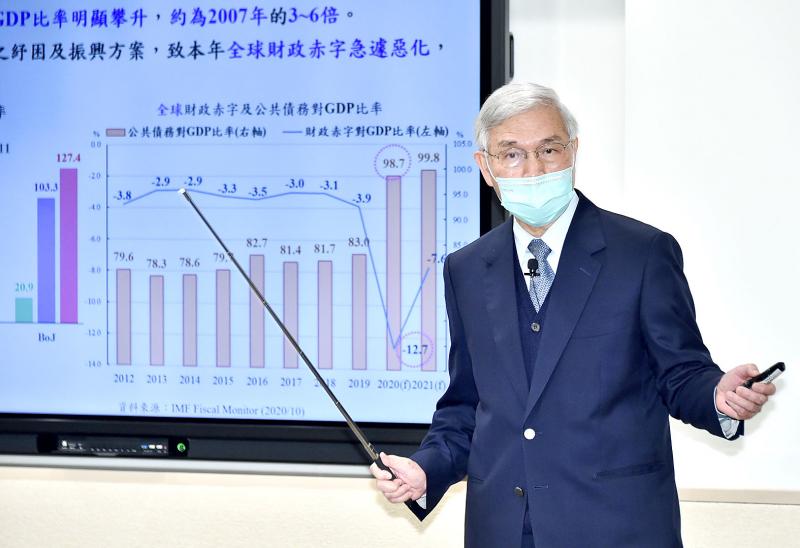To prevent land hoarding that could slow investment by companies returning home from China, the central bank on Thursday convened a meeting with 16 financial institutions to press for stricter review of industrial land financing.
Thursday’s meeting with eight private lenders, four life insurers and four payment companies came just two days after the nation’s top monetary policymaker sat down with eight state-run banks to convey the same message.
The central bank said that it urged the financial institutions to practice self-discipline and to demand concrete property development plans from borrowers seeking land financing.

Photo: Tu Chien-jung, Taipei Times
In the absence of development plans, borrowers should produce affidavits showing that they would begin construction by a certain time, the bank said.
Lenders should call in loans or charge higher interest rates if borrowers, mainly developers and contractors, fail to follow their construction schedules, it said.
Local trade groups have urged the government to step in and address soaring industrial land prices, as companies seeking to move production lines home have had difficulty finding industrial plots for factories.
However, there are areas in the nation that have idle plots of industrial land.
Several local development companies have told investors’ conferences that they have secured sufficient stocks of land to develop for years to come, and that selling land generates greater profits than developing residential complexes.
Businesses such as banks, life insurers and payment companies should adopt stricter standards when processing financing applications for land, the central bank said, adding that the businesses should also seek to prevent loans from contributing to land hoarding and price gouging.
The price of industrial land has noticeably picked up over the past few years due to limited supply and growing demand from companies returning from abroad, the central bank said.
Rising land prices would increase the cost of supply chain realignment and slow investment, it said, as it requested the cooperation of lenders.

PROTECTION: The investigation, which takes aim at exporters such as Canada, Germany and Brazil, came days after Trump unveiled tariff hikes on steel and aluminum products US President Donald Trump on Saturday ordered a probe into potential tariffs on lumber imports — a move threatening to stoke trade tensions — while also pushing for a domestic supply boost. Trump signed an executive order instructing US Secretary of Commerce Howard Lutnick to begin an investigation “to determine the effects on the national security of imports of timber, lumber and their derivative products.” The study might result in new tariffs being imposed, which would pile on top of existing levies. The investigation takes aim at exporters like Canada, Germany and Brazil, with White House officials earlier accusing these economies of

EARLY TALKS: Measures under consideration include convincing allies to match US curbs, further restricting exports of AI chips or GPUs, and blocking Chinese investments US President Donald Trump’s administration is sketching out tougher versions of US semiconductor curbs and pressuring key allies to escalate their restrictions on China’s chip industry, an early indication the new US president plans to expand efforts that began under former US president Joe Biden to limit Beijing’s technological prowess. Trump officials recently met with their Japanese and Dutch counterparts about restricting Tokyo Electron Ltd and ASML Holding NV engineers from maintaining semiconductor gear in China, people familiar with the matter said. The aim, which was also a priority for Biden, is to see key allies match China curbs the US

Teleperformance SE, the largest call-center operator in the world, is rolling out an artificial intelligence (AI) system that softens English-speaking Indian workers’ accents in real time in a move the company claims would make them more understandable. The technology, called accent translation, coupled with background noise cancelation, is being deployed in call centers in India, where workers provide customer support to some of Teleperformance’s international clients. The company provides outsourced customer support and content moderation to global companies including Apple Inc, ByteDance Ltd’s (字節跳動) TikTok and Samsung Electronics Co Ltd. “When you have an Indian agent on the line, sometimes it’s hard

‘SACRED MOUNTAIN’: The chipmaker can form joint ventures abroad, except in China, but like other firms, it needs government approval for large investments Taiwan Semiconductor Manufacturing Co (TSMC, 台積電) needs government permission for any overseas joint ventures (JVs), but there are no restrictions on making the most advanced chips overseas other than for China, Minister of Economic Affairs J.W. Kuo (郭智輝) said yesterday. US media have said that TSMC, the world’s largest contract chipmaker and a major supplier to companies such as Apple Inc and Nvidia Corp, has been in talks for a stake in Intel Corp. Neither company has confirmed the talks, but US President Donald Trump has accused Taiwan of taking away the US’ semiconductor business and said he wants the industry back